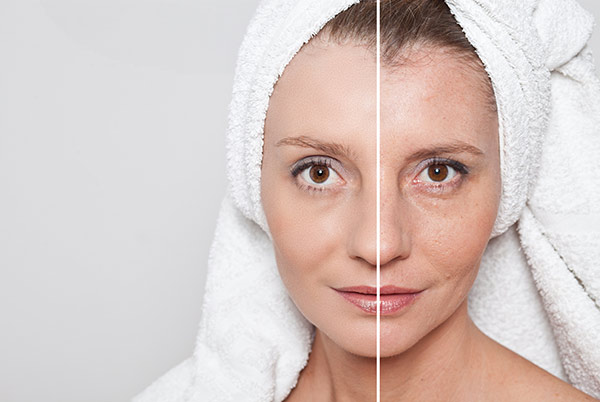
Is Gluten Aging You?
Would you rather “look” older than your years or “feel” older? That’s an unfair question, I suppose. We should probably offer up another option – neither! In fact, let’s opt for looking and feeling younger than our chronological age! We may have no sway over our chronological age but when it comes to biological age, we can definitely turn the clock backwards. One major way we can turn back the clock is by avoiding gluten.
Does ingesting gluten affect aging in any way? Certainly anything accelerating our internal aging is going to likewise reflect onto our exterior appearance, so let’s look at how gluten can affect internal aging.
When you speak of body aging, it’s important to begin at the simplicity of the cell. There are 10 trillion cells in your body and they are individual, functioning units. As is true of all living things, they must be fed and fed well to work optimally.
It’s interesting how everyone understands the need to “feed” their car gasoline for it to operate, but the average American can be quite surprised at the outcome of how their body functions when they change what’s on the end of their fork. It’s very common for patients, early on in their care, to be surprised when they begin to feel better. Often, no lab tests have yet returned and “all” we have done is alter their diet. They don’t understand how changing their diet can “do” anything. Why? We haven’t been indoctrinated to think of our food as fuel, good or bad.
I bring this up as an illustration of how malabsorption and maldigestion, both associated with a negative reaction to gluten, can result in premature aging. Is it surprising that poorly fed cells would age more quickly? It shouldn’t be; but again, it’s not necessarily something we’ve been taught to think about. It is the lack of proper nourishment of our cells that must be looked to in order to reverse the premature aging and shortening of life span associated with those suffering from gluten-related conditions – both celiac disease and non-celiac gluten sensitivity (NCGS).
Accurately and rapidly diagnosing celiac disease or NCGS is critical to ensure the proper nourishment of the body’s cells. So too is it vital to address what I call the secondary effects of gluten. If the presence of infections, toxins, leaky gut and the like is missed, it becomes impossible to properly feed the cells of the body, resulting in premature aging.
We have all heard about probiotics and their importance in feeding the population of good microbes living in the gut. The “good bacteria” total 100 trillion in number, 10 times the amount of cells in the body. The bacteria making up this entity, called the microbiome, provide strength and defense to the body. When balanced and healthy, these organisms fight off disease, even those “programmed” by our genes. It turns out that a healthy microbiome keeps bad genes turned “off” – meaning even if heart disease runs in your family, a robust microbiome can keep the genetic code for heart disease in the off position – ditto for celiac disease and many others.
Speaking of genes, how do we keep intact the genetic material in our cells such that they don’t prematurely age?
Something called telomeres, are essential parts of cellular aging. Telomeres are the caps at the end of each strand of DNA, much in the way a shoelace has a protective plastic tip to prevent the lace from unraveling. Inside each cell, within its nucleus, our genes are arranged along two strands of DNA molecules, twisted into a helix, that make up our chromosomes. At the ends of the chromosomes are the telomeres, also made of DNA, but what is unique about them is they protect each chromosome, keeping our genetic information intact within each cell when it decides to divide and reproduce itself.
Cells divide and reproduce to continue to survive, but each time they do so the telomere gets shorter. Once it gets too short, the cell is unable to divide and it dies. Some have likened telomeres to the fuse on a bomb; it gets shorter and shorter and finally “blows,” causing destruction, and in this case, cell death.
The human body is an amazing machine, one designed to last for 120 years (yes, many research studies have established this), and very able to repair itself. Therefore, you won’t find it surprising to learn of the telomerase enzyme – an enzyme designed to slow the shortening of our telomeres, thereby slowing the aging process.
Is there anything that can thwart this particular anti-aging enzyme from working properly? You bet. It’s called oxidation or oxidative stress. In much the way we learn as children that leaving our bike out in the rain results in a rusty bike due to oxidation of the metal, so too the human body does poorly under the assault of substances containing oxygen, which are highly reactive. Oxidation results from inflammation, infection, cigarettes and excess alcohol, to name just a few, and it damages our DNA, body proteins, and fats.
We often speak of inflammation when discussing root cause medicine, because inflammation is truly at the root of all degenerative disease. If inflammation causes disease processes to escalate, it makes perfect sense that it is also escalating cellular aging.
How does this relate to gluten? Gluten, in the intolerant individual, is absolutely pro-inflammatory. Celiac by definition is a hereditary, chronic inflammatory condition of the small intestine. The parts of the very large gluten protein resistant to normal digestion not only affect the very structure of the intestinal lining but also cause oxidative stress.
Gluten also weakens the immune system, opening us up to increased risk of infection. Therefore, gluten is closely associated with the two most common sources of oxidation (inflammation and infection), and thereby premature aging through telomere shortening.
Scientists have performed some interesting studies in neutralizing oxidation and witnessing life extension. These are animal studies, but oxidation creates similar damage across species. A particular study on worms saw a 44 percent increased lifespan through neutralizing oxidation.
It intuitively makes sense that the body is either prematurely aging or it’s healing itself – nothing is stagnant. But we do have the power to neutralize not only the path toward degenerative disease, but that of premature damage to our very genetic material, wielding the power of life or death over our cells. Of course, it goes beyond just a diagnosis of celiac disease or NCGS, but one cannot dismiss the power gluten has to speed the aging process in the wrong direction.
For example, gluten is highly associated with loss of bone density or osteoporosis. A 2007 study of women found that shortened telomeres are associated with decreased bone density. Having both occur does not prove causality, but it is interesting when taken together with everything else we have discussed.
Another example comes from a study of asymptomatic celiac patients who demonstrated oxidative stress despite the asymptomatic nature of the individuals. The researchers recommended increasing dietary supplementation of antioxidants, something that can definitely help. However, in my experience, it is less about taking a pill with such antioxidants as vitamins C, A, plus a variety of minerals, and more about identifying ongoing hidden sources of oxidation such as infections, toxins and the like, that are persistent sources of oxidative stress, despite a lack of symptoms in many.
We mentioned the secondary effects of gluten earlier. Here again is another great reason to work with a clinician who can definitively discover such factors as infections, cross-reactive foods, toxicity, leaky gut, and hormonal imbalance. It may be counterintuitive to think such factors can be present with few symptoms, but it does occur; we see it every day in practice. The tricky part is that the damage is occurring within the body despite the lack of outward symptoms.
Finally, gluten affects the stress glands, or adrenal glands, through its effect upon blood sugar and hormonal balance. The adrenal glands, when functioning properly, are one of the strongest parts of our body when it comes to anti-aging. In fact, repair and anti-aging are two of the major “job descriptions” of the adrenal glands. But once taxed, they do the reverse, speeding up the aging process.
Do we “wear” premature aging on our skin, the appearance of our hair, nails and overall vitality? Definitely. Does the external appearance reflect what is occurring within? Of course.
Do gluten conditions in the form of celiac disease and NCGS move us toward premature aging? They indeed do.
The great news is that while we can do nothing about chronological aging, biological aging can be reversed. It is a talent of the human body to repair itself and one I delight seeing in my patients on a daily basis.
 ABOUT THE AUTHOR: Dr. Vikki Petersen, winner of the “Gluten- Free Doctor of the Year” award, is a Doctor of Chiropractic, Certified Clinical Nutritionist, internationally published author, speaker, and co-founder of Root Cause Medical Clinic. She is the author of The Gluten Effect, a best-seller on gluten sensitivity and celiac disease.
ABOUT THE AUTHOR: Dr. Vikki Petersen, winner of the “Gluten- Free Doctor of the Year” award, is a Doctor of Chiropractic, Certified Clinical Nutritionist, internationally published author, speaker, and co-founder of Root Cause Medical Clinic. She is the author of The Gluten Effect, a best-seller on gluten sensitivity and celiac disease.



